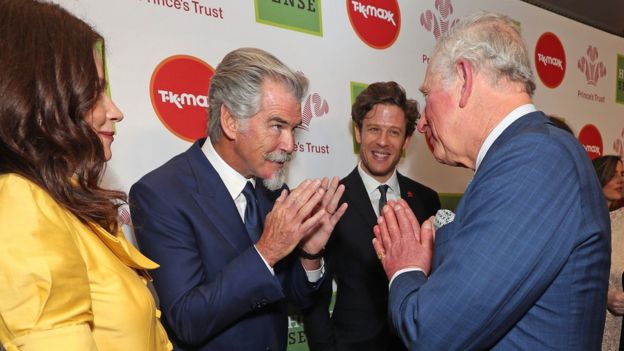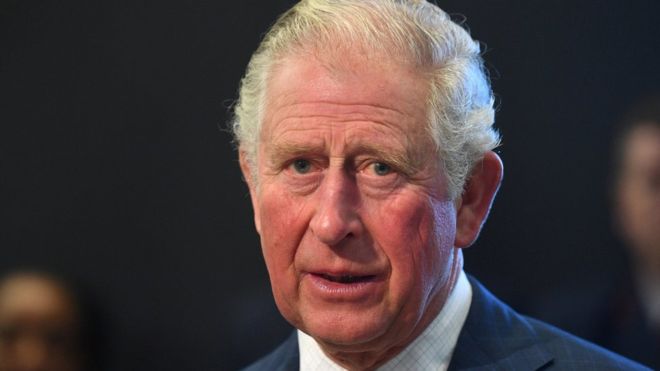The Prince of Wales is now out of self-isolation, following his diagnosis of coronavirus.
Prince Charles, 71, spent seven days self-isolating in Scotland after testing positive and displaying mild symptoms.
The Duchess of Cornwall, 72, was tested and did not have the virus, but will self-isolate until the end of the week.
A Palace official said the prince was in good health and was following the government's restrictions.
"Clarence House has confirmed today that, having consulted with his doctor, the Prince of Wales is now out of self-isolation," a spokesman said.
Prince Charles spent his seven days of quarantine at his Birkhall home on the royal Balmoral estate.
According to government guidelines, anyone with symptoms should self-isolate for seven days, while everyone living in their household should self-isolate for two weeks.

Buckingham Palace previously said the Queen last saw her son, the heir to the throne, on 12 March, and was "in good health".
It comes as six further people with the virus in Scotland have died, taking the total to 47.
READ ALSO: Prince Charles tests positive for coronavirus
The total number of people who have died with the virus in the UK has reached 1,228.
Among those to have died is Amged El-Hawrani, a 55-year-old ear, nose and throat consultant at Queen's Hospital Burton. Last week, an organ transplant consultant died after testing positive for the virus.
Some 20,000 former NHS staff have returned to work to help deal with the outbreak coronavirus, Prime Minister Boris Johnson has said, adding the country would get through the crisis "together".
Around one in four doctors are off work at the moment either with symptoms or isolating because family members have symptoms, the head of the Royal College of Physicians estimated.
The prime minister - who became the first world leader to announce he had the virus - has continued to lead the country's response to the pandemic, carrying out meetings over video link while self-isolating in his Downing Street flat.
On Monday, a No 10 source confirmed Dominic Cummings, his chief adviser, has developed symptoms of the virus and was self-isolating at home.
Meanwhile, the SEC in Glasgow is to be turned into a temporary NHS hospital, set to be operational within a fortnight and with 300 beds.
In other developments:
- Northern Ireland has become the first country in the UK to order the early release of prisoners due to the virus. Up to 200 inmates nearing the end of their sentences will be let out. The Scottish government is considering similar measures, while in England and Wales a range of options, including early release and the transfer of prisoners to other sites, is being explored
- Two repatriation flights rescuing British nationals who were stranded in Peru have landed at Heathrow Airport
- A breathing aid that can help keep coronavirus patients out of intensive care has been created in under a week by University College London engineers working alongside clinicians and Mercedes Formula One
- Police in Scotland issued 25 fines over the weekend to people breaking the coronavirus restrictions, such as businesses that were still open. The force also said it received a significant number of calls including from people reporting others who were breaking rules
- Airline EasyJet has grounded its entire fleet of aircraft due to the pandemic
- The boss of the UK's largest regional airline, Loganair, has said his firm plans to ask for government help to get through the pandemic
- Meanwhile, thousands of EasyJet and Virgin staff, are being offered work in the new NHS Nightingale Hospital, which is being set up at the ExCel Centre in east London. The chief nursing officer for England, Ruth May, said around 100 cabin crew have expressed an interest
- The UK's main internet providers have agreed to remove data caps on fixed-line broadband during the coronavirus pandemic
- A rapid response unit within the Cabinet Office is working with social media firms to remove misinformation about coronavirus
- Convenience stores selling Easter eggs are facing interference from "heavy-handed" officials suggesting chocolate eggs are non-essential, a trade body says
- In South Korea, there are calls to deport a British man in his 30s, who broke quarantine guidelines and may have spread the virus while travelling through the country. Instead of spending 14 days in self-isolation after arriving, he visited four different cities and later tested positive
Meanwhile, Mr Johnson said the public appeared to be obeying the restrictions set out by government to slow the spread of the virus, adding that train use was down 95% and bus use down 75%.
Prof Neil Ferguson, from Imperial College London and author of a report into the pandemic, told BBC Radio 4's Today programme there were "some early signs of slowing in some indicators" in the UK.
"If we look at the number of new hospital admissions per day for instance, that does appear to be slowing down a little bit now. It's not yet plateaued, so the numbers can be increasing each day, but the rate of increase has slowed."
Asked how many people may have been infected in the UK, Prof Ferguson said it varied across the country.
"[In] Central London it could be as many as 3% to 5% of the population has been infected, maybe more in individual hotspots. In the country as a whole, the UK, maybe 2% or 3%."





